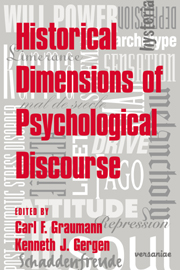Book contents
- Frontmatter
- Contents
- List of contributors
- 1 Psychological discourse in historical context: An introduction
- Part I Disciplining psychological discourse
- 2 The practice of psychological discourse
- 3 From tools to theories: Discovery in cognitive psychology
- 4 Metaphor and monophony in the twentieth-century psychology of emotions
- 5 Psyche and her descendants
- Part II History as culture critique
- Part III Early antecedents
- Part IV Lived history
- Author index
- Subject index
3 - From tools to theories: Discovery in cognitive psychology
Published online by Cambridge University Press: 20 October 2009
- Frontmatter
- Contents
- List of contributors
- 1 Psychological discourse in historical context: An introduction
- Part I Disciplining psychological discourse
- 2 The practice of psychological discourse
- 3 From tools to theories: Discovery in cognitive psychology
- 4 Metaphor and monophony in the twentieth-century psychology of emotions
- 5 Psyche and her descendants
- Part II History as culture critique
- Part III Early antecedents
- Part IV Lived history
- Author index
- Subject index
Summary
Let us look at scientific inquiry as “an ocean, continuous everywhere and without a break or division,” in Leibniz's words (1690/1951, p. 73). Hans Reichenbach nonetheless divided this ocean into two great seas, the context of discovery and the context of justification. Philosophers, logicians, and mathematicians claimed justification as a part of their territory and dismissed the context of discovery as none of their business, or even as “irrelevant to the logical analysis of scientific knowledge” (Popper, 1959, p. 31). Their sun shines over one part of the ocean and has enlightened us about matters of justification, but the other part of the ocean still remains in a mystical darkness where imagination and intuition reign, or so it is claimed. Popper, Braithwaite, and others ceded the dark part of the ocean to psychology and, perhaps, sociology; but few psychologists have fished in these waters. Most did not dare or care.
In this chapter, I will argue that discovery can be understood by heuristics (not a logic) of discovery. I will propose a heuristic of discovery that makes use of methods of justification, thereby attempting to bridge the artificial distinction between the two. Furthermore, I will attempt to demonstrate that this discovery heuristic may not only be of interest for an a posteriori understanding of theory development, but also may be useful for understanding limitations of present-day theories and research programs and for the further development of alternatives and new possibilities.
- Type
- Chapter
- Information
- Historical Dimensions of Psychological Discourse , pp. 36 - 59Publisher: Cambridge University PressPrint publication year: 1996
- 4
- Cited by



